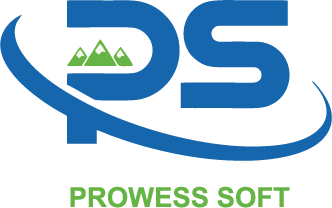Blog
Building an AI-Powered MCP Server for MuleSoft
- October 22, 2025
- Jithendra Mouli Devi Chundi
From Idea to Production: Building an AI-Powered MCP Server for MuleSoft in 30 Minutes
From Idea to Production: Building an AI-Powered MCP Server for MuleSoft in 30 Minutes
Introduction
Imagine saying to your AI assistant:
“Create a customer management API with CRUD operations and OAuth2 security.”
Thirty seconds later, your API is live on MuleSoft’s Anypoint Exchange.
That’s the power of CurieTech AI + MuleSoft MCP integration.
This guide walks you through how our technical team built an AI-powered MCP server in mulesoft that transforms API creation from hours of manual work to seconds of intelligent automation.
Imagine opening Claude and saying: “Create a customer management API with CRUD operations and OAuth2 security” — and 30 seconds later, it’s published to Anypoint Exchange. That’s exactly what we built.

The Problem Every MuleSoft Developer Faces
If you’ve ever worked on MuleSoft’s Anypoint Platform, you know these pain points:
- Syntax wrestling with YAML indentation and RAML structure
- Documentation deep-dives for every new endpoint
- Repetitive boilerplate for security, errors, and metadata
- Manual uploads to Anypoint Exchange
A 30-minute API specification can easily balloon into a full day’s effort.
The Game-Changing Solution: AI-Powered MCP
What if you could eliminate 90% of this friction through natural conversation with AI?
I built an MCP server using CurieTech AI that creates this seamless workflow:
Developer Idea → CurieTech AI → MCP Server → Claude → MuleSoft → Anypoint Exchange
Result: Natural language becomes production-ready APIs in seconds.
What is MCP?
Building the System: Complete Step-by-Step Guide
Prerequisites
- MuleSoft Anypoint Platform credentials
- CurieTech AI account
- Git repository
- Claude Desktop application
Step 1: Create Anypoint Platform Integration with CurieTech AI
In CurieTech AI :
- Navigate to Repository Coder (starting fresh).
- Select “No Repository”
- Use this comprehensive prompt:
Create an API that works with Mulesoft platform APIs:
=> It should have these endpoints :
* /Get project Details
* / createProject
* /createSpec
* / publish
=> Bearer token or Authentication should be performed within the HTTP request configuration using the OAuth module with the client credentials grant type. It should request:
Token url: https://anypoint.mulesoft.com/accounts/api/v2/oauth2/token
client_id: Should be taken from the properties file
client_Secret: Should be taken from the properties file
=> required host and URL for /Get project Details:
curl – location ‘https://anypoint.mulesoft.com/designcenter/api-designer/projects’ \
– header ‘Authorization: Bearer 85fd7b8f-9b81-4ffb-87a8-a2001625eaaf’ \
– header ‘x-organization-id: 6a2f41a3-c54c-fce8-32d2-0324e1c32e22′ \
– header ‘x-owner-id: 6a2f41a3-c54c-fce8-32d2-0324e1c32e22′ \
– header ‘Cookie: XSRF-TOKEN=dE8Fn4GJ-xHP4LSG9ny4RMEfTGZPVHFP3zFo; _csrf=8KI6-Vh1fyUypQhcdtFnaUKg’
=> required host and url for /createProject:
curl – location ‘https://anypoint.mulesoft.com/designcenter/api-designer/projects’ \
– header ‘Authorization: Bearer 85fd7b8f-9b81-4ffb-87a8-a2001625eaaf’ \
– header ‘x-organization-id: 6a2f41a3-c54c-fce8-32d2-0324e1c32e22′ \
– header ‘x-owner-id: 6a2f41a3-c54c-fce8-32d2-0324e1c32e22′ \
– header ‘accept: application/json‘ \
– header ‘Content-Type: application/json‘ \
– header ‘Cookie: XSRF-TOKEN=dE8Fn4GJ-xHP4LSG9ny4RMEfTGZPVHFP3zFo; _csrf=8KI6-Vh1fyUypQhcdtFnaUKg’ \
– data ‘{“name”: “MyTestProject“, “classifier”: “raml“}’
=> required host and irl for /createSpec:
curl “https://anypoint.mulesoft.com/designcenter/api-designer/projects/{projectId}/branches/{branch}/save” \
-X POST \
-d “[\n {\n \”path\”: \”/folder/text.txt\”,\n \”content\”: \”Content of the file\”\n },\n {\n \”path\”: \”/folder/text2.txt\”,\n \”content\”: \”Content of the file2\”\n }\n]” \
-H “x-owner-id: 6a2f41a3-c54c-fce8-32d2-0324e1c32e22” \
-H “x-organization-id: 6a2f41a3-c54c-fce8-32d2-0324e1c32e22” \
-H “authorisation: Bearer 5757gh76″
=> required host and url for /publish:
Curl – location ‘https://anypoint.mulesoft.com/designcenter/api-designer/projects/01d57846-4988–4be3- a5a5-826c49244a03/branches/master/publish/exchange’ \
– header ‘Authorization: Bearer 85fd7b8f-9b81-4ffb-87a8-a2001625eaaf’ \
– header ‘x-organization-id: 6a2f41a3-c54c-fce8-32d2-0324e1c32e22′ \
– header ‘x-owner-id: 6a2f41a3-c54c-fce8-32d2-0324e1c32e22′ \
– header ‘accept: application/json‘ \
– header ‘Content-Type: application/json‘ \
– header ‘Cookie: XSRF-TOKEN=dE8Fn4GJ-xHP4LSG9ny4RMEfTGZPVHFP3zFo; _csrf=8KI6-Vh1fyUypQhcdtFnaUKg’ \
– data ‘{
“name”: “test-mcp“,
“apiVersion“: “0.1”,
“version”: “1.0.0”,
“main”: “test-mcp.raml“,
“assetId“: “test-mcp“,
“groupId“: “5ab94143-989d-4c0f-9dfc-2e58b1a0d77a”,
“classifier”: “raml“
}’
=> make sure to use property place holders for x-organisation-id and x-owner-id
What CurieTech AI Generated:
✅ Complete MuleSoft flows for all four operations.
✅ OAuth2 authentication with token management
✅ Comprehensive error handling and logging
✅ Clean, modular project structure
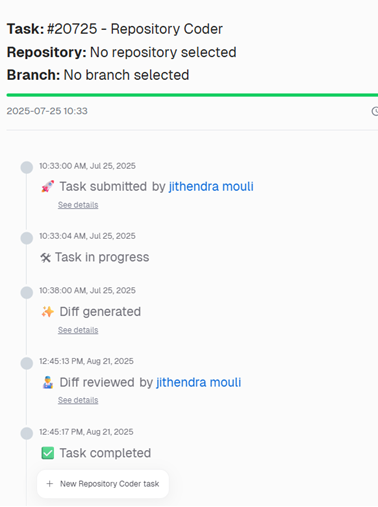
And finally, when you download and import your project, it looks like this:

Note: Test your MuleSoft application locally before proceeding to ensure all endpoints work correctly with your Anypoint Platform credentials.
Push to Git:
git init
Git add.
git commit -m “Initial Anypoint Platform integration”
git push -u origin main
Step 2: Transform to MCP Server — The Core Magic
Now that we’ve explored the No Repository option, let’s move on to the With Repository approach — where CurieTech AI really shines.
First, connect your Git repository to CurieTech AI:
- In CurieTech AI, navigate to your account settings
- Go to the Repositories section
- Click “Connect Repository” and authorise access to your Git provider (GitHub, GitLab, etc.)
- Select the repository you just created and pushed in Step 1

In CurieTech AI Repository Coder:
- Select your existing Git repository
- Provide this detailed transformation prompt
“Convert this API into an MCP (Model Context Protocol) server using the Mule MCP connector.”
What CurieTech AI Delivered:
Complete MuleSoft + MCP Architecture:
mulesoft-mcp-project/
├── src/main/mule/
│ ├── anypoint-integration.xml # Main MuleSoft flows
│ ├── global-config.xml # Global configurations
├── src/main/resources/
│ ├── mule-app.properties # Environment properties
│ ├── log4j2.xml # Logging configuration
├── mcp-server/
│ ├── index.js # MCP protocol handler
│ ├── mcp-tools.json # MCP tool definitions
│ └── bridge.js # Bridge to MuleSoft HTTP APIs
└── pom.xml # Maven dependencies
MuleSoft Flow Structure (Generated by CurieTech AI):
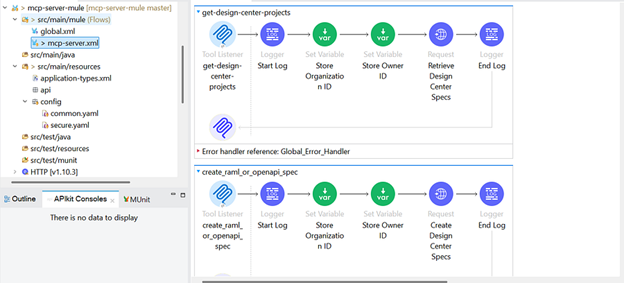
MCP Bridge to MuleSoft (Node.js):
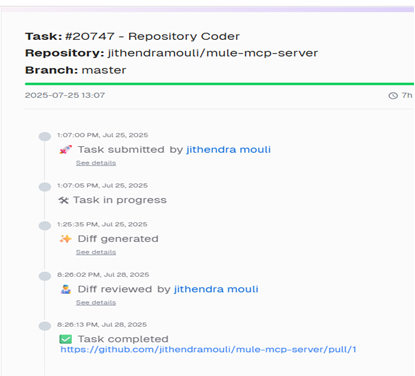
Key Intelligence: The real breakthrough? CurieTech AI doesn’t just generate code — it acts like a senior developer who never sleeps. After reviewing my changes, it automatically raised a PR with proper commit messages, branch naming, and merge strategies. No manual Git commands, no forgotten documentation updates. Just pure, intelligent automation that understands developer workflow.
Step 3: Configuration & Testing
MuleSoft Application Setup:
- Importing the generated MuleSoft project into Anypoint Studio
- Configure src/main/resources/mule-app.properties:
# Anypoint Platform Credentials
anypoint. Client.id:${ANYPOINT_CLIENT_ID}
anypoint. Client.secret:${ANYPOINT_CLIENT_SECRET}
anypoint.org.id:${ANYPOINT_ORG_ID}
anypoint. Owner.id:${ANYPOINT_OWNER_ID}
# HTTP Configuration
http.port = “8081”
- Before you run your application, add a JVM argument in Anypoint Studio run configurations:
-Dmule.http.service.implementation=NETTY
“Deploy and start your MuleSoft application. Once it’s up and running, you’re all set to begin testing with the MCP server we just built.”
Claude Desktop Configuration: Add this to ~/dashboard/file/settings/Support/developer/claude_desktop_config.json:
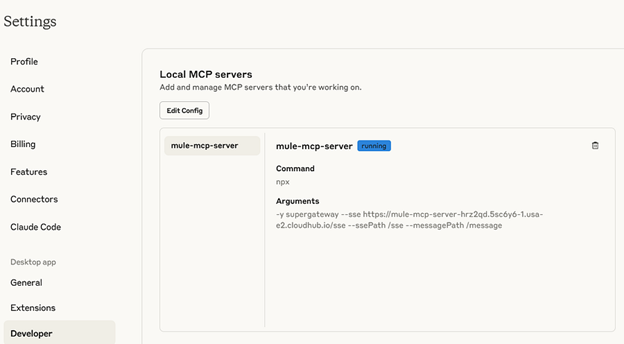
{
“mcpServers”: {
“mule-mcp-server”: {
“command”: “npx”,
“args”: [
“-y”,
“supergateway”,
“–sse”,
“http://localhost:8081/sse”,
“–ssePath”,
“/sse”,
“–messagePath”,
“/message”
]
}
}
}
Restart Claude Desktop to load the new MCP server.
Real-World Testing: The Magic in Action
Test 1: Simple API Creation
Me: “Create a test MCP spec with two endpoints, one is ping and the other is a sample post endpoint”
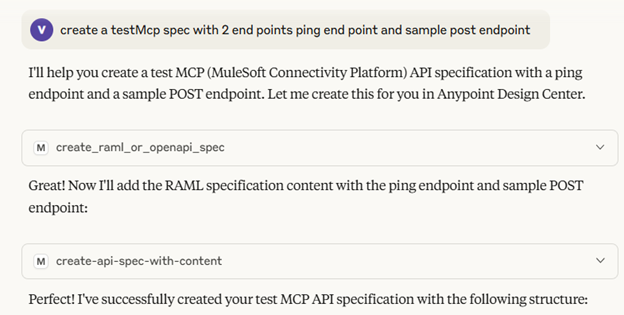
Claude: ✨ Instantly generates:
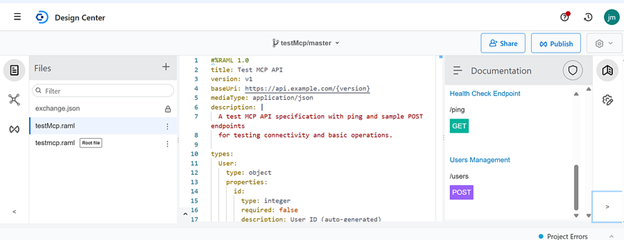
Test 4: Publishing Verification
Me: “Can you publish this project to Exchange?”
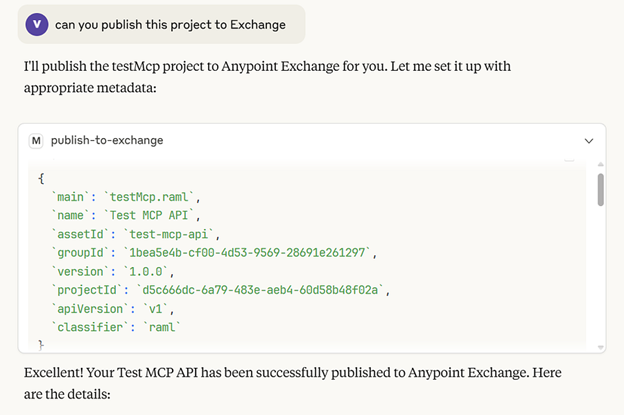
Claude:
✅ inventory-management-v1 (Published, v1.0.0)
✅ ecommerce-order-api-v1 (Published, v1.0.0)
✅ health-check-api-v1 (Published, v1.0.0)
All include complete documentation and are ready for implementation!
Why CurieTech AI Made This Possible
Repository Intelligence: Analysis of existing code patterns and architecture
Seamless Transformation: Converted API client to MCP server in minutes
Auto-Configuration: Generated all necessary config and setup files
Git Integration: Created PR when changes were approved
Context Preservation: Remembered project structure across sessions
Key Advantage: Most AI tools give generic templates. CurieTech AI understood both my existing MuleSoft implementation and MCP protocol requirements, creating a production-ready integration that maintains enterprise standards.
Results: Before vs After
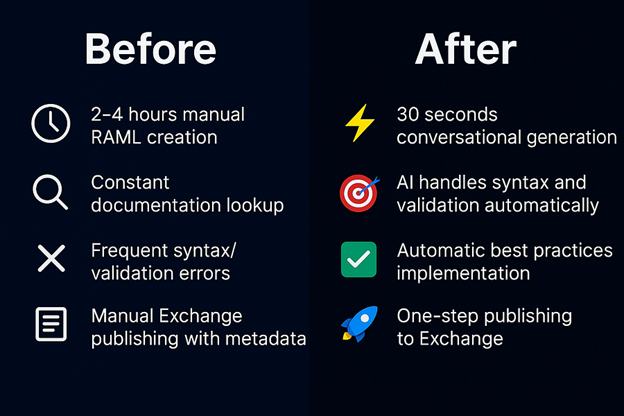
Quick Implementation Checklist
Complete this 30-minute setup checklist:
Phase 1: Core Integration
- Create MuleSoft integration with CurieTech AI Repository Coder
- Configure Anypoint Platform credentials
- Test all endpoints locally
- Push to Git repository
Phase 2: MCP Transformation
- Transform to the MCP server with CurieTech AI
- Install Node.js dependencies
- Configure Claude Desktop MCP settings
- Test the MCP server connection
Conclusion
In under an hour, we’ve built a complete MCP server for MuleSoft Anypoint Platform that transforms API development from hours of manual work into seconds of natural conversation. This solution delivers:
✅ Massive Time Savings: 95%+ reduction in API specification creation time
✅ Enterprise-Grade Quality: Maintains security, error handling, and documentation standards
✅ Seamless Integration: Works directly with existing Anypoint Platform workflows
✅ Team Scalability: Enables rapid API development across the organisation
Next Steps
Ready to revolutionize your MuleSoft development workflow? Here’s how to get started:
- Try the Solution: Follow the implementation guide with your own Anypoint Platform
- Customize for Your Needs: Extend the RAML templates for your specific API patterns
- Scale Across Teams: Deploy the MCP server organization-wide following MCP server deployment MuleSoft best practices.
- Share Your Success: Document your time savings and ROI improvements
What RAML specification would you create first through conversation?
The future of API development is conversational, and with CurieTech AI, that future is available today.
References:

Editor: Jithendra Mouli Devi Chundi
Frequently Asked Questions:
An MCP (Model Context Protocol) server in MuleSoft connects AI models with the MuleSoft Anypoint Platform, enabling natural language-driven API creation, automation, and integration management.
AI tools like CurieTech AI automate API design by generating RAML specifications, security configurations, and publishing workflows — reducing development time from hours to minutes.
CurieTech AI is an AI-powered development assistant that integrates with MuleSoft to generate flows, configurations, and MCP servers using natural language prompts and contextual learning.
With CurieTech AI, you can build and deploy an MCP server for MuleSoft in under 30 minutes — including configuration, testing, and publishing to Anypoint Exchange.
AI-driven RAML creation eliminates syntax errors, automates repetitive tasks, ensures API compliance, and significantly boosts developer productivity.
Yes. CurieTech AI automates the publishing of API projects directly to MuleSoft Anypoint Exchange, managing metadata, documentation, and version control seamlessly.
Yes. AI can handle end-to-end automation — from writing API specs to configuring authentication, handling errors, and publishing APIs to Anypoint Exchange automatically.
You’ll need MuleSoft Anypoint credentials, a CurieTech AI account, a Git repository, and the Claude Desktop app to connect and automate the API development process.
CurieTech AI includes OAuth2 authentication, token management, and error handling in the generated MuleSoft projects, ensuring enterprise-grade security compliance.
AI-driven MuleSoft development boosts productivity by up to 95%, cuts manual effort, ensures consistent standards, and accelerates time-to-market for enterprise integrations.

